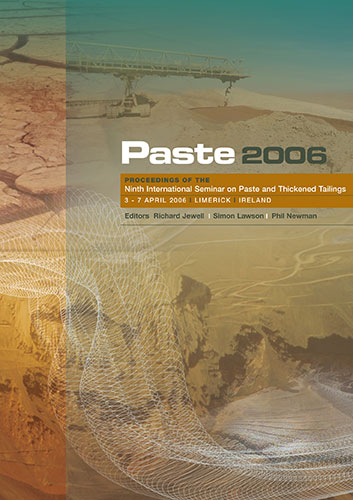Rheological Assessment – A Road Map for Plant Designers and Operators

|
Authors: Sofra, F |
DOI https://doi.org/10.36487/ACG_repo/663_2
Cite As:
Sofra, F 2006, 'Rheological Assessment – A Road Map for Plant Designers and Operators', in R Jewell, S Lawson & P Newman (eds), Paste 2006: Proceedings of the Ninth International Seminar on Paste and Thickened Tailings, Australian Centre for Geomechanics, Perth, pp. 13-23, https://doi.org/10.36487/ACG_repo/663_2
Abstract:
One of the fundamental prerequisites for the design and implementation of a successful thickened tailings or paste systems is a comprehensive understanding of the rheological characteristics of the material. Although rheological characterisation is often out-sourced, it is essential that design engineers and plant operators have a grasp of the variables which must be considered, the questions that need to be addressed and familiarity with rheological assessment principles in order to determine the validity of data provided for the purpose intended. Good rheological data for one particular sample under one specific set of testing conditions is generally insufficient for design and/or optimisation of entire processing systems and the related equipment. An ‘up-front’ understanding of how rheological parameters affect and influence operations will result in more efficient and sustainable plant performance and can mitigate many potential problematic issues. This paper is designed to be a rheology road map, guiding the reader through a checklist of rheological questions to ask and issues to address - from sampling to testing protocols, data analysis and informed data application.
© Copyright 2025, Australian Centre for Geomechanics (ACG), The University of Western Australia. All rights reserved.
View copyright/legal information
Please direct any queries or error reports to repository-acg@uwa.edu.au
View copyright/legal information
Please direct any queries or error reports to repository-acg@uwa.edu.au